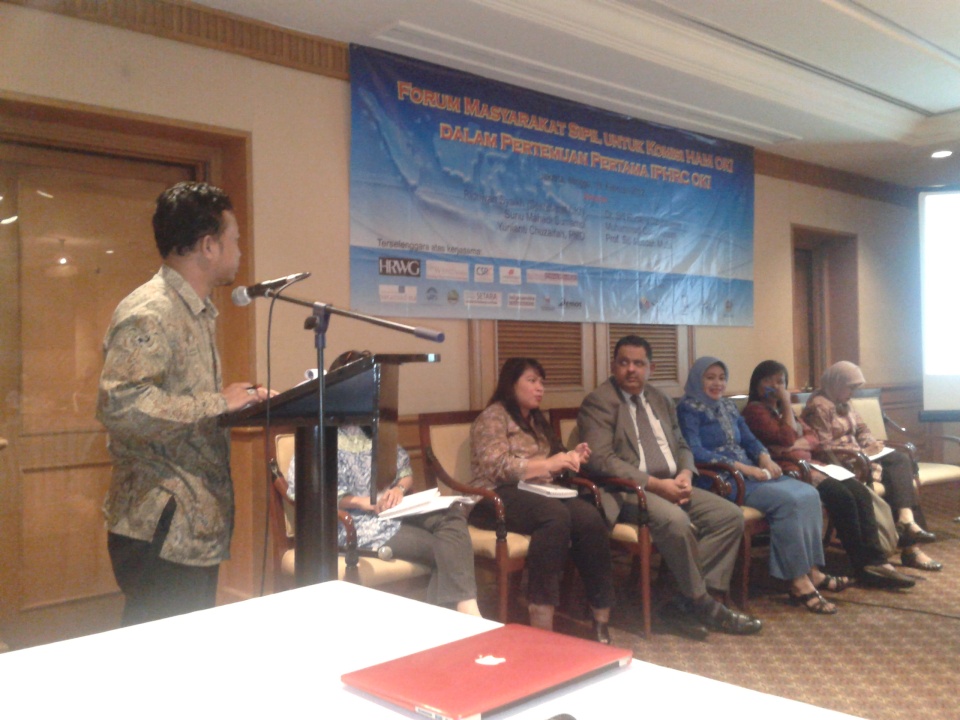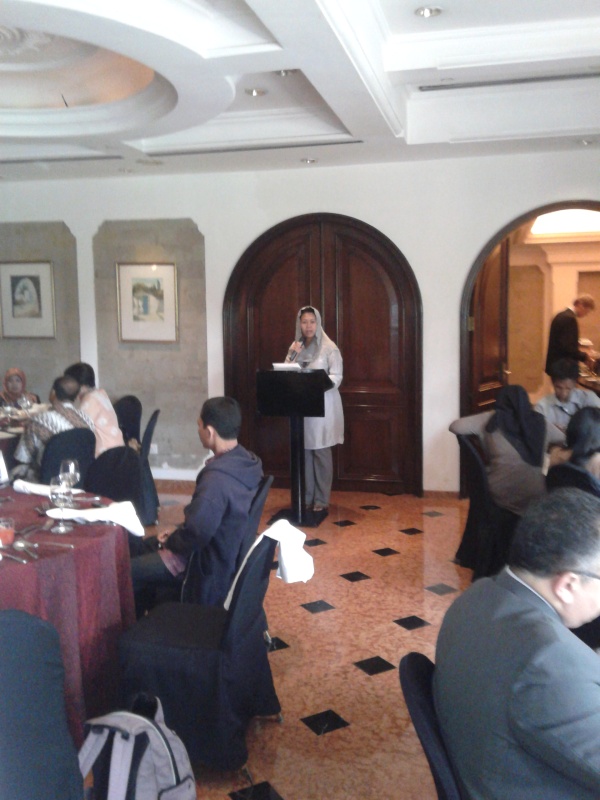Statement by H.E. Dr. R.M. Marty M. Natalegawa, Minister for Foreign Affairs of the Republic of Indonesia, At the 38th Session of The Council of Foreign Ministers of OIC, Astana, Kazakhstan, 28 June 2011
Tuesday, 28 June 2011

Statement by
H.E. Dr. R.M. Marty M. Natalegawa
Minister for Foreign Affairs of the Republic of Indonesia
At the 38th Session of The Council of Foreign Ministers of
The Organization of Islamic Conference
Astana, Republic of Kazakhstan, 28 June 2011
Bismillah ir-Rahman ir-Rahim
Your Excellency, Mr. Yerzhan Kazykhanov, Minister of Foreign Affairs of the Republic of Kazakhstan,
Your Royal Highness and Your Excellencies Ministers,
Your Excellency Prof. Ekmeleddin Ihsanoglu, Secretary-General of the OIC,
Distinguished Delegates,
Assalamu’alaikum Wr. Wb.
First, I wish to pay warm tribute to the Republic of Kazakhstan for hosting the 38th OIC Council of Foreign Ministers. May I also congratulate you, Minister Kazykhanov, on your election as Chair of this meeting.
Indonesia wishes to express its appreciation to the Republic of Tajikistan for its successful chairmanship over the past year. Our appreciation also goes to the Secretary-General and the General Secretariat for its constant support to the work of the OIC.
Mr. Chairman,
The Ummah today is not immune from the multifaceted challenges confronting the international community at large.
Traditional challenges, as well as non-traditional ones.
All defying national solutions and demand, instead, cooperation and partnership between nations – developed and developing, large and small.
Indeed, some of such pressing challenges are to be found amidst us – the Islamic Ummah. Of the promotion of peace and security; of prosperity and of good governance and democracy.
We must act with a sense of purpose in addressing such challenges. At the same time, also in identifying new opportunities so that we fully harness the potential that we know our Ummah possesses.
Thus, we must get our act together as an Organization. On the basis of our new Charter. To realize our Ten-year Plan.
Mr. Chairman,
As part of the global community, representing no less than 1.5 billion of the world’s population, the Organization has created a strong foundation for reform to enable it to become more effective in representing the interests of the Ummah.
Indeed, the potential for mutually-beneficial cooperation among its members is large , and the potential for the Organization to make a difference is limitless.
We have formulated a new Charter and launched the 10 Year Program of Action (TYPOA). They provide sound guidelines for the development of the organization.
Meanwhile, the new logo–reflecting the new vision and mission of the Organization— and the renaming of the OIC into the Organization of Islamic COOPERATION – both endorsed at this Council For Foreign Minister, will add to the package of reforming the organization into a modern, rule-based organization, able to respond to the multiple global challenges affecting us all.
The Secretary-General has reported noteworthy developments on the implementation of the Ten Years Program of Action. These developments are encouraging. However, we need to continue to seek avenues to better the performance of the Organization, and redouble the efforts to achieve the goals we have put ourselves. In this way, we would be able to meet international standards of professionalism and become even more effective in fostering the collective interest of member states.
If we are true to the goals of reform, we would be a more credible force.
Mr. Chairman,
Six years on after the launching of the Ten Years Program Of Action and three years after the Charter has been in force, much work remains. Our Ummah is confronted with continuous challenges in all spheres, political, economic, and social. On the political front, over the past months, the Islamic world is going through a defining moment in its history with unprecedented developments in many of our member countries.
During this turbulent and challenging times, we must ensure that the process of good governance, rule of law, consolidation of human rights, and broader political participation will become central to our efforts and is consolidated.
These events have had an impact on each Member State because the issues involved in these historic events are the same ones that our organization is trying to address, issues of political, social and economic significance.
It is essential that we underline the significance of these issues, not only for individual States and their people, but also for our relationship with each other.
This means, among others: strengthening political participation; and implementing social programmes and policies aimed at combating poverty and improving the lives of everyone in society.
Further, the OIC should bolster its ability to play a more constructive role in the maintenance of international peace and security, particularly in its member states, as envisioned in the new Charter. It should offer itself as part of the solution to the various challenges to the international peace and security.
Mr. Chairman,
Meanwhile, the economic and social landscape shows that there are areas of prosperity, peace and progress in the Islamic world, where some muslims enjoy a high standard of living and become major players in the world economy.
But, there are also pockets of poverty, conflicts, and ignorance.
We also face the reality that a considerable portion of the Islamic world are still lagging behind in terms of worldwide socio-economic progress.
Statistics reveal that only four muslim majority countries are considered among the biggest 30 economies of the world. Muslim majority countries are not in the top 10 world traders.
Among the 30 best performing nations in terms of human development index, no countries within our organization is on the list.
Among the most competitive countries in the world, again no single muslim majority country is on the list.
According to UNICEF, there are still over 4,3 million children under 5 in OIC countries who die each year from preventable disease and malnutrition.
We should do more to uplift the Ummah, to rectify these statistics and to provide better education, homes and standards of living to our citizens.
Mr. Chairman,
Another big step forward we can make is to agree on the establishment of the OIC Independent and Permanent Commission on Human Rights.
The establishment of such Commission is important for the positive evolution of the Organization towards a modern entity capable of addressing the interest of its members. Indonesia strongly supports the establishment of this Commission and stands ready to provide the necessary means for it efficient functioning.
Mr. Chairman,
We must nurture and build upon the recent progress made in inter-Palestinian reconciliation. We must inject fresh momentum in pursuit of the Palestinian inalienable rights.
The realization of an independent Palestinian state continues to face hurdles. The current Israeli Government has consistently undermined efforts to move the peace process forward, while continuing to oppress the Palestinian population.
OIC member states should intensify and coordinate efforts to realize Palestine statehood by September 2011, including its admission as member of the UN. Just last month in Bali, Indonesia, the Non-Aligned Movement too has committed to do just that and to show support to the plight of Palestinian political prisoners.
In addition to active political support, Indonesia continues to provide concrete assistance in the form of capacity building programmes to Palestinian citizens.
Mr. Chairman,
Indonesia is pleased that the OIC continues to contribute to the building of peace in various parts of the world. In Southeast Asia, our Organization, through the OIC Peace Committee on the Southern Philippines, of which Indonesia is Chair, continues to facilitate the peace process between the Government of the Philippines (GPH) and the Moro National Liberation Front (MNLF) and to ensure full implementation of their 1996 Peace Agreement.
As mandated by the 4th Tripartite Meeting between the GPH, MNLF and the OIC, in Jeddah on February this year, both sides, with the facilitation of Indonesia as Chair of the OIC Peace Committee on Southern Philippines, met in the City of Solo, Indonesia 20-22 June 2011. The AdHoc High Level Group meeting resulted in narrowing down the differences on the remaining outstanding issues: i.e. the extent of the autonomous region, transitional government and revenue sharing. On revenue sharing, concrete results emerged from this meeting.
Indonesia believes that the implementation of the agreements on various important issues has the potential to lead to a gradual improvement of the situation on the ground and serve as confidence-building measures for all stakeholders in southern Philippines, and create an atmosphere conducive to resolving the remaining issues.
It should also be noted that since the beginning of the peace process on southern Philippines, the Government of the Philippines has earnestly cooperated with OIC. Indonesia, therefore, continues to urge the OIC to grant observer status to the Philippines Government, as this will demonstrate how the OIC engages and cooperates with non-member countries with significant Muslim minority populations. With the planned endorsement of a criteria for states to become observer to the OIC at this CFM, it is our believe that the Philippines can be granted observer status.
Mr. Chairman,
The world continues to face multifaceted challenges.
Problems of peace and security. Economic and social problems.
As a very large part of the developing world, we in the OIC must rise to the challenge of a new responsibility. We must do our part in making a better world.
And the making of a better world starts with ourselves. It starts right here and now. By making the OIC a more effective organization. Insya Allah
I thank you.
















